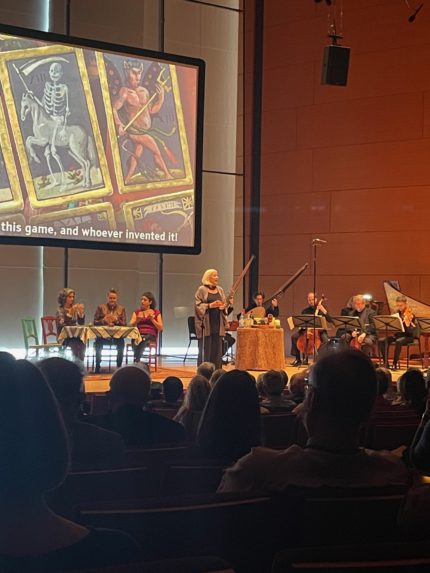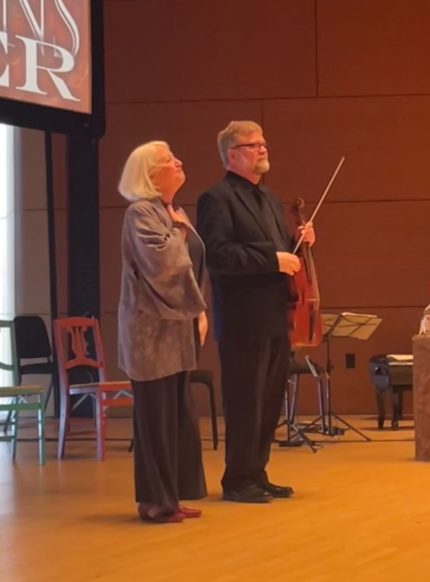Newberry Consort directors sign off with a charming, convivial farewell

It wasn’t always fun and games for the Newberry Consort over the past 35 years as Chicago’s pioneering ensemble for historically informed performance braved various crises to build a local following for early music.
But “The Newbs” not only survived but flourished. And with longtime members David Douglass and his wife, Ellen Hargis leading it onward and decidedly upward as co-artistic directors over the last 15 years, it remains a model for every other specialized group of its kind.
After the Covid gloom and doom that all but shut down live local classical music for the past two and a half years, everyone was in the mood for something light, even frothy. Such was the convivial entertainment among friends that toasted the retirement of Douglass and Hargis, Sunday afternoon in Northwestern’s Galvin Recital Hall in Evanston.
The consort’s season finale—a program of imaginatively chosen, painstakingly curated vocal and instrumental discoveries from the Italian baroque, titled “Four Queens and a Joker”—was typical of what Newberry Consort audiences have come to expect from the couple’s hands-on artistic stewardship.
The title referenced the Italian baroque composer Antonio Caldara’s comic chamber cantata Il Giuco del Quadriglio (The Game of Quadrille), about four competitive female friends enjoying an evening of cards and cocktails.
Additional 17th century-style Italianate gamesmanship came courtesy of Virgilio Mazzocchi’s little comic cantata La Civetta (The Owl), also for four sopranos with instrumental ensemble functioning as basso continuo.
Nothing in the least profound here, but, with crisply stylish performances enlivened by clever staging and graceful dancing by stage director and choreographer Marie-Nathalie Lacoursieres (costumed as the joker-harlequin of the two playlets), everything went down most agreeably.
Card games were a huge fad in royal courts and well-bred households of 18th century Europe. Caldara acknowledged as much with his charming cantata—really more a chamber opera or serenata teatrale, a popular entertainment at the Viennese court where he was employed. The 1734 Game of Quadrille was in fact written to celebrate the birthday of archduchess Maria Theresa.
Scored for strings and continuo, with obbligato turns for violin, recorder and a pair of baroque mandolins, it offers each of the card players her own aria. The shrewish bitterness of one of the characters, Ottavia, stands in contrast to the idealistic jollity of her cocktail-quaffing friends. Ultimately, one-upmanship is the name of the game, and there’s a happy-ending quartet in which “Madame Morality” is left to enjoy her musings.
The pleasing soprano of Lucia Mier y Teran Romero, as the pedantic Camilla (one of her pronouncements translates as “I shall pick for myself the most delicate fruit”) was particularly winning. But all four women (Allison Selby Cook, Salome Sandoval and Hargis played the other characters) sang well. Besides functioning as elegant dancer and commedia dell’arte-style stage manager, Lacoursieres dispatched her sopranino recorder solo delightfully. Adding her joker to the deck (the character was Hargis’s invention, not Caldara’s) was an inspired touch of ancient-modern theatricality.
The civetta was a popular board game of the period—a kind of 17th century blind man’s bluff—and Mazzochi musicalized it as a comic intermezzo between acts of his five-act opera San Bonifazio. The music has its modest charms but exists in only one source, while restoring missing portions of the text and correcting numerous errors in the score required the assistance of the Italian scholar Aldo Roma. Hargis and Douglass fleshed out the cantata with instrumental excerpts drawn from Mazzochi’s Saint Boniface opera.
Sunday’s performance had four high-spirited female singers, each in modern garb, meeting at a hunting lodge, ostensibly to hunt birds but actually to compete in the eponymous board game. Because civetta also means “coquette” in Italian, there was a fair amount of teasing, squabbling and giggling before the piece ran its brief course.
Hargis and friends appeared to be having great fun with the music, intertwining voices beautifully over the dancing rhythms of the accompanying strings and continuo. The purposely silly staging included colloquial surtitles (“My bad!” exclaimed one of the women), the passing along of hand sanitizer, and the singers munching chocolate coins as they exited. Lacoursieres nearly stole the show with her hilariously stylized impersonation of a balletic cuckoo and hen.
The vocal pieces bookended a flavorsome intermezzo consisting of string sinfonie. and other instrumental pieces.
Douglass and his fellow instrumentalists upheld their end of the proceedings strongly with a suite from Marco Uccellini’s Sinfonie Boscarecie (Woodland Symphonies), a mandolin sonata by Giovanni Battista Sammartini and Caldara’s 1699 Chiacona.
Hargis, in her informative program note, called Uccellini “quirky” and that was an apt description of his surprising, forward-looking pieces for strings and continuo, nimbly performed.
It was also nice to hear the sonata so brilliantly rendered on the seldom-heard baroque mandolin by Daniel Swenberg, who was accompanied by Brandon Acker on theorbo. Kudos as well to their colleagues Allison Monroe, Guillermo Salas-Suarez and Douglass, violins; Jeremy David Ward, cello; and Charles Metz, harpsichord. Shawn Keener’s production design illustrated the musical proceedings with relevant projections of period artwork.

A roaring standing ovation greeted the splendid singers, instrumentalists and dancer-choreographer at the end. The loudest cheers were of course reserved for the outgoing directors, who beamed, hugged and accepted bouquets from the audience, which they in turn passed along to their fellow musicians—a token of the mutual respect they have long cultivated among their colleagues.
It’s good news that Douglass and Hargis will return to the Consort as senior advisors beginning next season, when they will be succeeded in the director’s chair by the historical brass player and scholar Liza Malamut.
Posted in Performances





Posted Apr 27, 2022 at 11:03 am by Jim Brown
I tested positive for COVID the day before this concert and thus couldn’t attend. I am of course heartbroken and bitterly disappointed at missing this event that I’d been looking forward to so much.
If perchance the show was recorded, please let your fans know how to view/listen/obtain an opportunity sorely missed.
Thank you David and Ellen for the many years of sublime enjoyment.
Posted Apr 27, 2022 at 11:03 am by Helga Binder
I wish Ellen and David a good retirement. My late husband and I have greatly enjoyed the performances since we moved to Evanston in 2008 and I am looking forward to many more